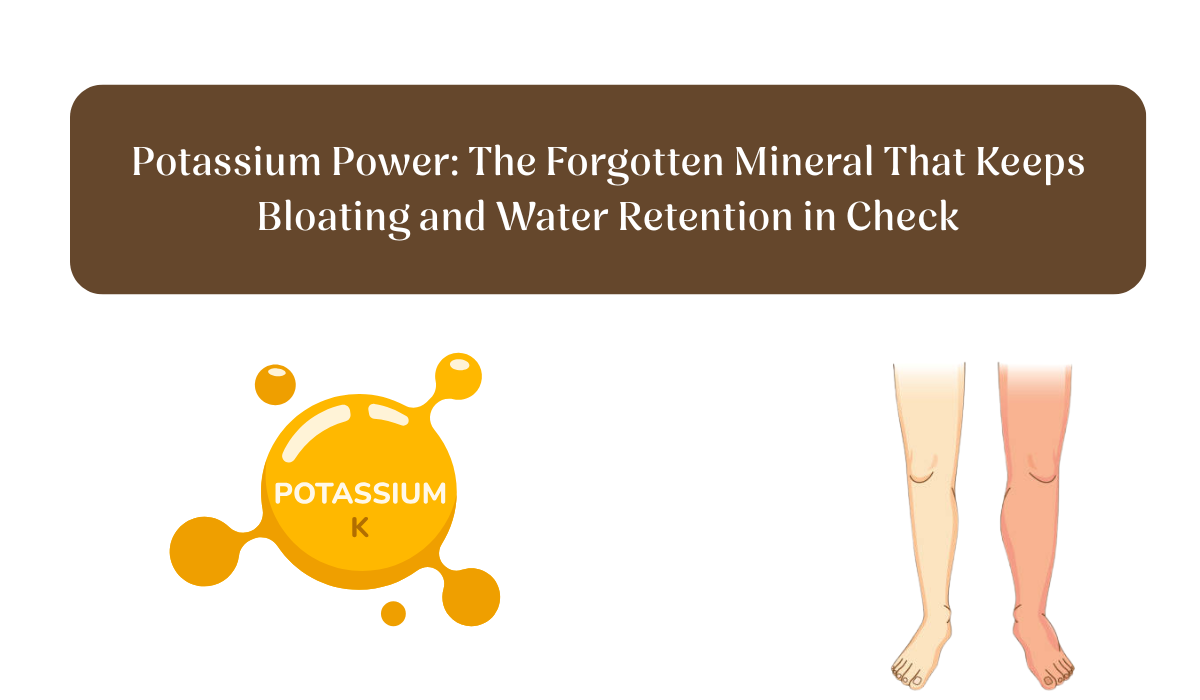Ever felt bloated, puffy, or unusually heavy — even when you’ve been eating clean?
Most people quickly blame excess salt, poor digestion, or even hormones. But what if the real reason is something you’re not eating enough of?
Welcome to the underrated world of potassium — a mineral that rarely gets the spotlight but plays a quietly powerful role in regulating your fluid balance, supporting your nerves and muscles, and preventing that sluggish, “water-retained” feeling.
Why Potassium Is So Important – And So Overlooked
Potassium is an electrolyte, much like sodium, but its role is opposite:
-
While sodium pulls water into the tissues, potassium helps draw it out and flush it through the kidneys.
-
It balances the water inside and outside your cells — like a gatekeeper for puffiness and fluid overload.
-
It supports nerve signals, muscle contractions, and heart rhythm.
Yet, despite its importance, potassium deficiency is incredibly common — especially among people who are health-conscious but unknowingly missing the mark.
Surprising Causes of Low Potassium in Everyday Life
You might be losing potassium — or not absorbing it — even with a decent diet. Here’s how:
-
High salt intake (common in Indian pickles, namkeens, sauces) increases potassium needs.
-
Diuretics and blood pressure medications can flush it out.
-
Overconsumption of caffeine or alcohol accelerates loss.
-
Skipping fruits and veggies in favor of “high-protein” or keto diets.
-
Heavy sweating (through intense workouts or summer heat) without proper replenishment.
-
Gut absorption issues due to chronic bloating or IBS.
Signs Your Body May Be Craving Potassium
These signs are often misunderstood or misattributed to other causes:
-
Feeling bloated despite low salt intake
-
Swollen fingers, feet, or under-eye puffiness
-
Tired even after good sleep
-
Muscle cramps or twitching
-
Heart palpitations or irregular beats
-
Salt cravings
-
Low BP or dizziness upon standing
Everyday Indian Foods That Are Rich in Potassium
Forget the myth that only bananas count. Here are potassium-rich foods commonly available in Indian kitchens:
| Food | Serving | Potassium (approx) |
|---|---|---|
| Coconut water | 1 glass | 500–600 mg |
| Boiled aloo (with skin) | 1 medium | 900 mg |
| Spinach (cooked) | 1 cup | 850 mg |
| Sweet lime or orange | 1 fruit | 350–400 mg |
| Avocado | ½ fruit | 500 mg |
| Muskmelon/papaya | 1 cup | 300–400 mg |
| Moong dal | ½ cup cooked | 350 mg |
| Tomato juice or puree | ½ cup | 400–500 mg |
| Dried apricots/raisins | Small handful | 250–300 mg |
Pro Tip: Cooked and blended vegetables often retain potassium better and are easier on bloated stomachs.
The Hydration-Potassium Equation
Here’s what many miss:
Just drinking more water doesn’t reduce bloating — it needs the right minerals to move out.
If your water intake is high but potassium is low, you’ll feel more waterlogged, not less.
What to do:
-
Add coconut water, jeera water, or lime water with rock salt into your day
-
Break your day into small potassium-rich snacks — don’t bunch all fruits in one meal
-
Avoid taking potassium-rich foods right after salty packaged meals (sodium blocks absorption)
At IntuiWell, Here’s What We See Often:
Many people who come to us with bloating, fatigue, and fluid retention are already:
-
Eating “healthy”
-
Drinking 3+ liters of water
-
Watching their salt intake
But they’ve unknowingly created a mineral imbalance.
Once we correct:
-
Potassium-sodium ratio
-
Hydration quality
-
Meal spacing and gut absorption
— their puffiness, cravings, and sluggishness start to melt away. Without drastic detoxes or fancy supplements.
Quick Recap: Practical Ways to Boost Potassium Naturally
-
Start your day with coconut water or jeera water
-
Include 1 fruit rich in potassium daily (muskmelon, banana, orange)
-
Eat boiled aloo with skin, not just rice daily
-
Use dals like moong, tur, chana — they’re underrated mineral sources
-
Keep processed salty foods low, especially at night
-
Add a vegetable stew or spinach dal in dinner for warmth + potassium
Final Thought:
Bloating is not just about food intolerance or gut bacteria.
Sometimes, it’s a quiet cry for mineral balance.
And potassium, the underdog of nutrition, might just be your body’s best-kept secret to feeling light, stable, and well.



